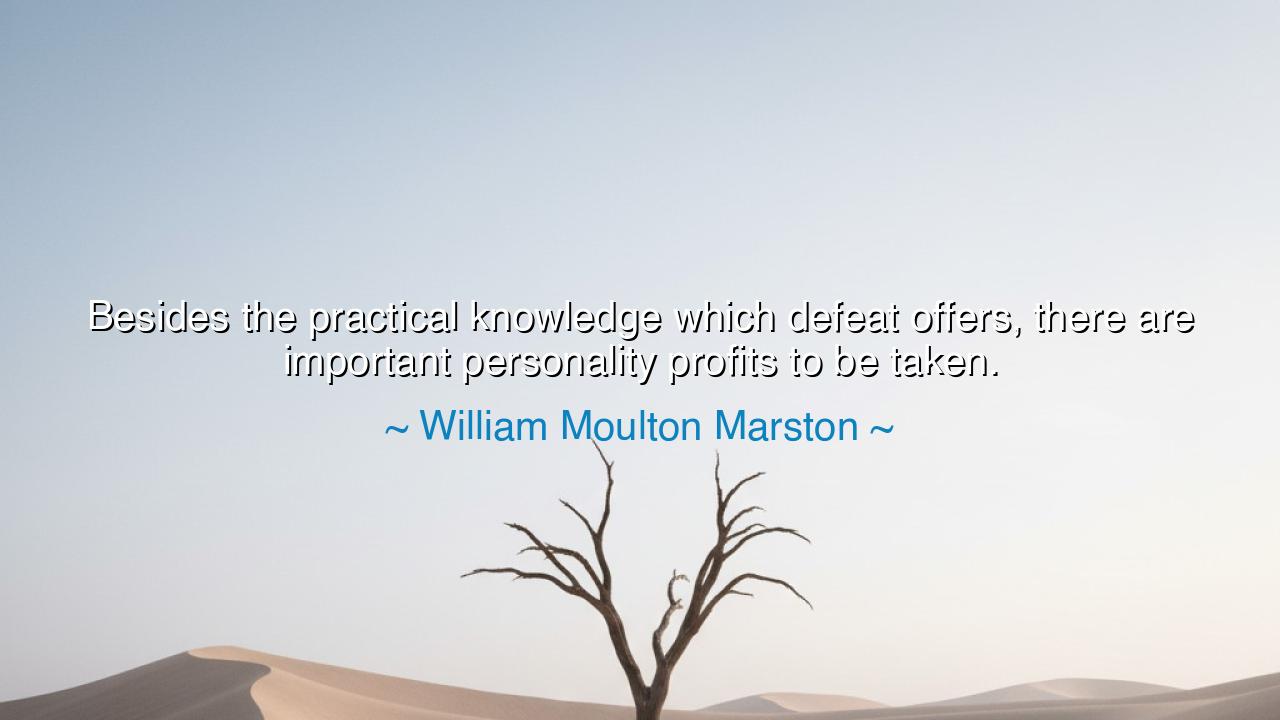
Besides the practical knowledge which defeat offers, there are
Besides the practical knowledge which defeat offers, there are important personality profits to be taken.






“Besides the practical knowledge which defeat offers, there are important personality profits to be taken.”
Thus spoke William Moulton Marston, a man of curious genius — psychologist, philosopher, and the very creator of Wonder Woman. His words pierce to the heart of the human struggle, revealing a truth that few embrace willingly: that defeat, far from being a curse, is one of life’s greatest teachers. In this saying, Marston reminds us that the losses we suffer are not barren wastelands, but fertile fields, rich with the seeds of knowledge and character. Every downfall, every humiliation, every disappointment conceals within it not only practical lessons, but the means to shape a stronger, wiser, and more resilient self.
When he speaks of “practical knowledge,” Marston refers to the lessons that failure brings — the kind that cannot be learned from success. Success, for all its glory, conceals weakness; it blinds us with the brilliance of victory and often whispers that we are invincible. But defeat strips us bare. It reveals our errors, exposes our illusions, and forces us to confront the reality we would rather ignore. In this way, defeat is a mirror — a harsh, honest one — showing us the limits of our understanding and the faults in our foundation. Yet Marston tells us that beyond this practical understanding lies something greater: the “personality profits” — the transformation of the inner self, the moral and emotional gains that make defeat not merely instructive, but redemptive.
The origin of this insight lies in Marston’s own extraordinary life. Trained in law and psychology, he was a man of contradictions — at once a scientist of the mind and a storyteller of myth. He believed deeply in the power of human emotion and the potential of love and courage to overcome adversity. His own career was not without failure. Many of his ideas were dismissed, his research challenged, his methods criticized. Yet through it all, he grew stronger. From defeat, he learned empathy; from rejection, he learned patience; from struggle, he created art that would inspire generations. Wonder Woman herself was born from that conviction — a symbol not of unbroken strength, but of strength refined through trial, of courage born from pain.
To understand Marston’s teaching, consider the story of Abraham Lincoln, whose life stands as a testament to the profits of defeat. Before he became one of history’s greatest leaders, Lincoln was a man acquainted with failure — in business, in politics, and in love. He faced ridicule, loss, and despair so profound that he once doubted he could continue living. Yet each defeat carved in him a deeper compassion, a clearer purpose, a steadier will. When, at last, he rose to lead a divided nation, he did so not as one untouched by suffering, but as one shaped by it. His wisdom, humility, and endurance — the fruits of his character — were the “personality profits” that Marston spoke of, born only through the crucible of repeated failure.
What Marston teaches is not the glorification of defeat, but its redemption. Defeat, like fire, destroys or purifies depending on how it is met. The weak allow it to break them; the wise allow it to remake them. To fall is not disgrace, but opportunity — a call to self-examination and rebirth. The “personality profits” of which he speaks are courage, humility, resilience, and empathy — the very qualities that make a soul noble. These cannot be purchased in comfort; they are forged in pain. Every failure endured with dignity and reflection adds depth to the spirit, strength to the will, and compassion to the heart.
There is a subtle, heroic wisdom here — for Marston, being a psychologist, understood that human greatness lies not in avoiding pain but in transforming it. Just as the oyster turns the grain of sand into a pearl, so must man turn his defeats into treasures of the spirit. Each setback is raw material for greatness, if only one dares to learn from it. Those who are crushed by failure see only the wound; those who are elevated by it see the lesson. It is this alchemy of the soul that Marston calls us to practice — the art of taking the harsh metal of defeat and refining it into the gold of character.
Therefore, O seeker of strength, take this teaching to heart: do not flee from defeat, but face it as a teacher. When you fail, ask not “Why me?” but “What must I learn?” Reflect upon your errors without despair; draw wisdom from your wounds without bitterness. Let the blows of life carve you into a vessel of greater purpose. For the man who has never been broken has never been truly made whole, and the soul that has never fallen has never learned to rise.
In the end, Marston’s words remind us that knowledge and character are twin rewards of adversity. From defeat we learn what does not work, but more importantly, we discover who we are. To those who endure with courage, defeat is not an end but a beginning — a crossing from ignorance to insight, from pride to humility, from mere survival to wisdom. And so, when next you fall, remember: within the ashes of loss lie the glowing embers of rebirth. Tend them with patience and faith, and they shall light your way toward victory of a higher kind — not over others, but over yourself.






AAdministratorAdministrator
Welcome, honored guests. Please leave a comment, we will respond soon